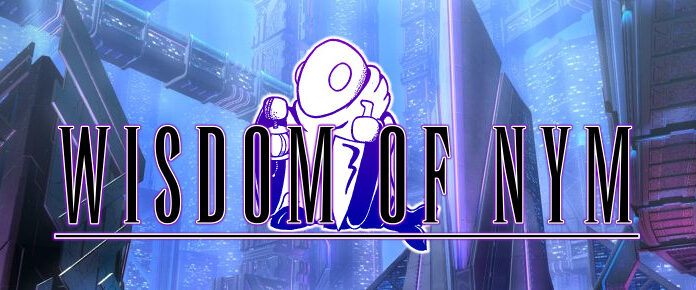
After enjoying some video games with deck-building mechanics, I’ve been motivated to spend more time playing actual, physical card games. Following a fair bit of research, I’ve settled on Arkham Horror: The Card Game to be my focus for the time being, as it’s one of the few card games that’s focused on playing cooperatively rather than competitively.
I started with it because I wanted a good card game, but increasingly I find it scratches another itch. It does, if only some small way, fill the void left in my heart by the de facto death of The Secret World.
By the time I started writing here at MassivelyOP, TSW — and its lackluster reboot, Secret World Legends — were already pretty defunct, so I haven’t had much time to write about it in this venue, but TSW was my favourite MMO, and perhaps my all-time favorite video game, period. I was entranced by its story, its mission design, its combat, and its build system.
Looking back, it’s surprising this wasn’t my clue to get into card games sooner, as deck-building card games and their systems of keyword synergies were the main inspirations behind TSW‘s ability wheel. Hence why builds were known as “decks.”
I’ve never had a head for the kind of math-based theory-crafting most RPGs are based on — start telling me about break points and hit caps, and I’ll go cross-eyed — but something about these kind of synergy-based systems just clicks for me.
It feels natural to me to decide I’m interested in affliction effects, and then just stack my build with abilities that apply or trigger off of afflictions, and I’m increasingly realizing I have a near-bottomless appetite for the construction of these kind of builds, be it in a video game like TSW or Magic: Legends or with an actual, physical deck of cards.
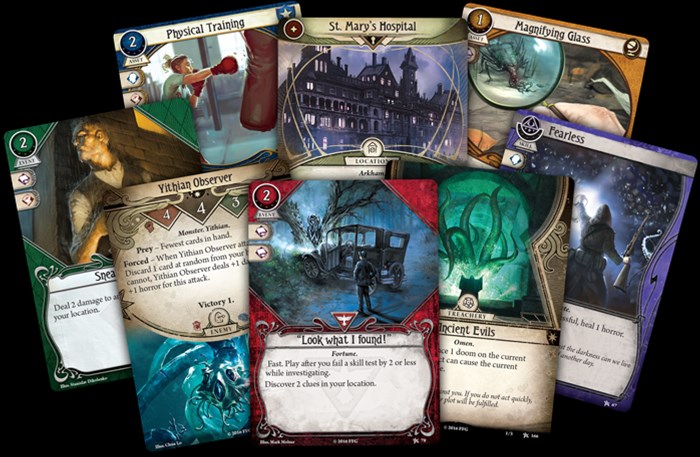
It is this desire that led me to exploring card games and eventually to Arkham Horror: The Card Game. Arkham Horror itself is a larger franchise of tabletop games, including multiple board games. The franchise is a direct adaptation of the Cthulhu Mythos of H.P. Lovecraft, with many Arkham Horror products serving as direct sequels or tie-ins to Lovecraft’s stories. For instance, the Dunwich Legacy campaign for the card game takes place shortly after the events of the short story The Dunwich Horror.
The franchise is therefore focused around the early 20th century (the era Lovecraft lived and wrote in), so it’s not quite the modern setting of TSW, but it’s a decent analogue. You can still enjoy a setting that combines magic tomes and dreadful beasts alongside firearms and mad science.
Arkham Horror: The Card Game is one of several card games published by Fantasy Flight Games, which include both co-op and competitive titles (I did look into the other co-op card games under their banner but have decided to focus on Arkham Horror for now as it seems to be most polished of them).
All of those are dubbed “Living Card Games,” which is mostly a marketing buzzword but does carry one piece of useful information: Unlike a trading card game, Fantasy Flight’s LCGs do not sell randomized booster packs. They’re still money pits that require multiple expansions to achieve the best possible experience, but you can at least be sure you know what you’re getting in each pack. There’s no gambling here.
Rather than feeling like Magic: The Gathering, the Arkham Horror LCG actually ends up feeling more like an RPG, like Dungeons and Dragons, in many ways. You choose a playable character, an “investigator,” and then build a deck of cards to represent your investigator’s skills, abilities, and equipment. Most tasks are accomplished via semi-randomized skill checks (using tokens drawn from a bag rather than dice).
The RPG feel is further heightened by the game’s format. Each session sends players through a story-driven scenario, most of which are part of longer campaigns where your choices, successes, and failures can have lasting impacts.
The RPG-like format goes a long way to making the inevitable comparison to The Secret World.
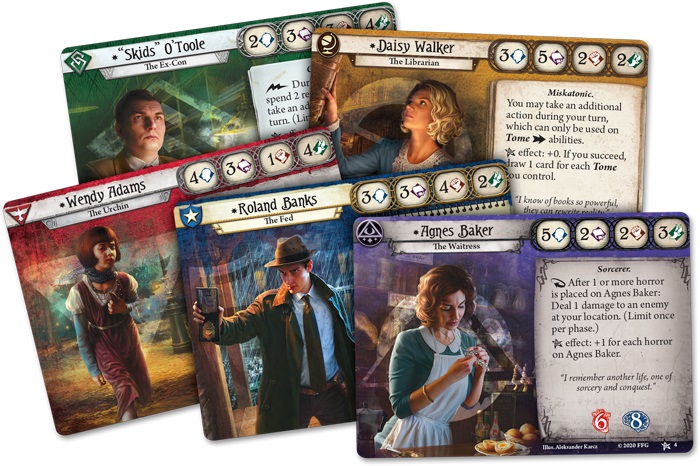
Before I go further, I would like to get the obvious out of the way: A physical card game is never going to fully replace an MMORPG. There are many things TSW could do that Arkham Horror simply can’t, most notably the blurred line between the game and reality accomplished by things like investigation missions and the Twitterverse experiment.
Arkham Horror is not a replacement for TSW. But while I am still early in my journey with this game, I will say that it does a better job of scratching some of the same itches than I would have expected going in.
What’s impressed me most about the Arkham Horror LCG so far is the quality of its story-telling. Obviously there is a limit to what can be achieved when the story is delivered entirely through small blocks of text on cards… but that limit is a lot higher than I would have expected.
What makes it really work — and where it really starts to feel like TSW in table-top format — is that Arkham Horror does a brilliant job of using game mechanics to help tell the story. It’s a very challenging game, especially playing solo, and it excellently captures the feel of a near-hopeless struggle against dreadful eldritch powers.
In my first session, a run of bad luck had my character — Roland Banks, an FBI agent in over his head — down to a single point of sanity. When a powerful boss spawned, I figured I was doomed to fail on my first scenario. But then I realized that one of the possible endings for that scenario is for your character to literally run away screaming… so that’s what I did. And I later learned that’s actually one of the best possible endings to that scenario.
Even the random draws of player cards can sometimes feel like they are telling a story. In my second scenario, Roland was tasked with unmasking members of a dread cult before they could enact their wicked plans. Along the way, I played Beat Cop as my ally card, and I immediately pictured Roland coming across some poor rookie officer and pulling rank on them to drag them into his bizarre odyssey.
To meander back to my point, both Arkham Horror: The Card Game and The Secret World feel like games that push the envelope in regards to what their respective media are capable in the realm of marrying story and game mechanics. And in both cases, the result is a deeply immersive experience.
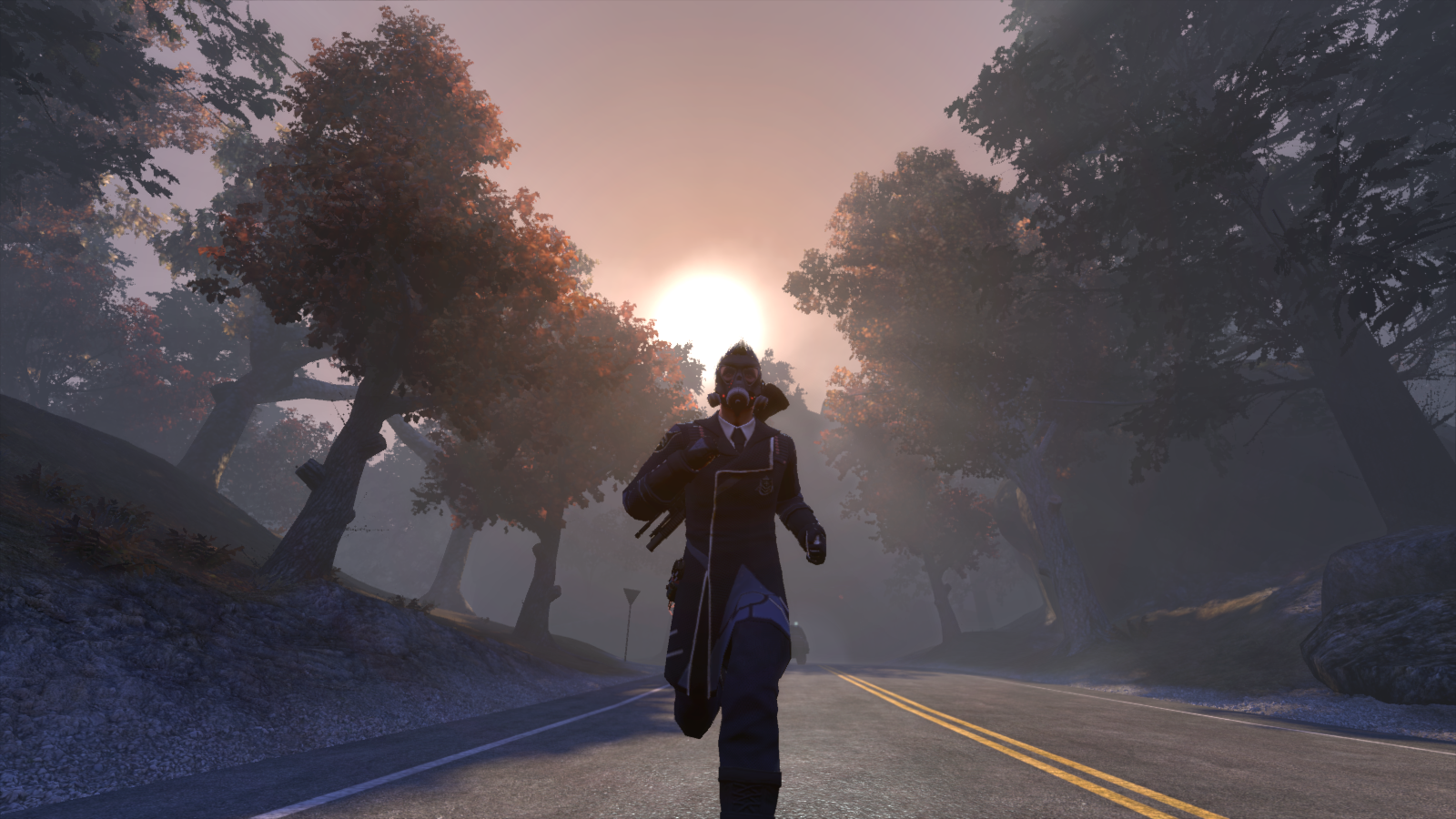
I’m really amazed by how much Arkham Horror can draw me in sometimes. When I was searching the streets of Arkham for those cultists, I could almost feel the chill night air and hear the burble of the Miskatonic River. It’s much the same as the way Kingsmouth used to draw me in, and make TSW come alive.
The other main area where Arkham Horror gives me TSW vibes is in the realm of deck-building. Right now I wouldn’t say it’s quite as much fun as the ability wheel was (in part because my options are limited by how much I’ve bought), but it does still provide some pretty satisfying theory-crafting.
Investigators in this game are divided into classes, but most investigators have limited access to the cards of a second class, and if you squint and tilt your head a bit, you could see this as akin to your choice of two weapons in TSW. There is also a smaller pool of neutral cards that any class can take, similar to the weapon-agnostic slices of the outer wheel.
On the plus side, though, the wide pool of investigators and the unique abilities available to each one make for interesting deck-building opportunities. Roland, for example, can gather clues (the main victory condition of many scenarios) by killing monsters. Therefore he can devote less of his deck to clue-gathering and instead divert more resources to becoming a combat machine.
When it comes to downsides to the Arkham Horror LCG, there are two main ones that I see right now. One that I have already alluded to is that this game has a horrific, unquenchable thirst for your money. Expansions are pricey, and you’ll probably want more than one if you want to get the most out of deck-building and have enough content to play.
The publishers are shifting over to a new distribution model based on fewer but larger releases, starting with the upcoming Edge of the Earth expansion and continuing in early 2022 with a re-release of the Dunwich Legacy, and that model does math out to a lower cost for each expansion cycle, but it will still be on the expensive side.
Also, like a lot of hobbyist games like this, there’s a lot of set-up and take down every time you play. A single session generally takes me from ninety minutes to two hours, and nearly half of that is just setting things up and then putting them away when I’m done. And that’s not counting the effort of building a deck between sessions (although I’d say that’s part of the fun).
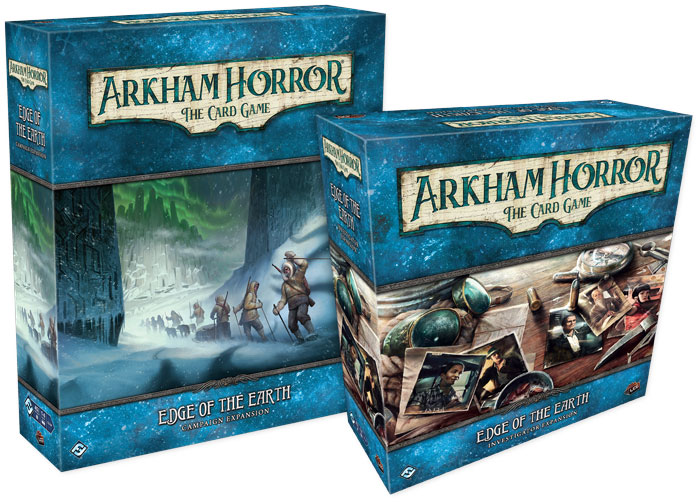 I’m also a bit concerned about its replay value, given its story-driven nature, but many fans will tell you that trying different decks and making different choices in the story provide sufficient variation to keep things fresh, so we’ll see.
I’m also a bit concerned about its replay value, given its story-driven nature, but many fans will tell you that trying different decks and making different choices in the story provide sufficient variation to keep things fresh, so we’ll see.
In terms of ways it doesn’t measure up to TSW… well, it’s a card game, not an MMO. You can play solo or with up to three other people, but there’s not that sense of shared world community.
Nor can it equal the production values of a big budget video game. The art on the cards is pretty, but it’s not the same as having fully realized graphical world you can explore. And it doesn’t have Jeffrey Combs.
Still, if it’s not a true replacement for TSW, it is perhaps the next best thing. Put on Bright September or the OST while you play, and it’s almost like being back in the Dark Days.
 Are you burned out on MMOs? It happens. But there are plenty of other titles out there with open worlds, progression, RPG mechanics, and other MMO stalwarts. Massively OP’s MMO Burnout turns a critical eye toward everything from AAA blockbusters to obscure indie gems.
Are you burned out on MMOs? It happens. But there are plenty of other titles out there with open worlds, progression, RPG mechanics, and other MMO stalwarts. Massively OP’s MMO Burnout turns a critical eye toward everything from AAA blockbusters to obscure indie gems.
